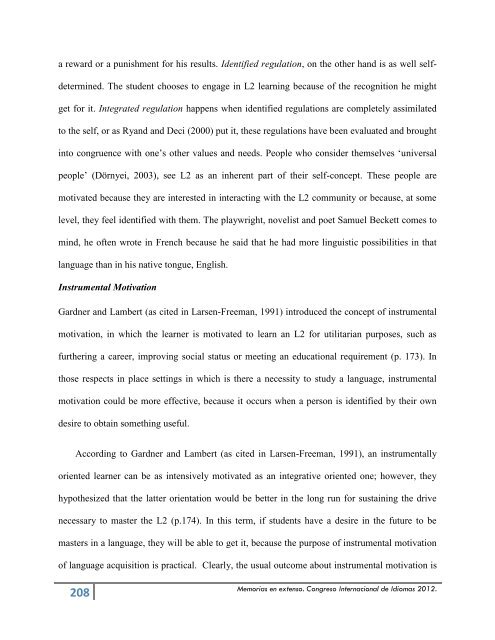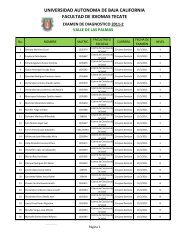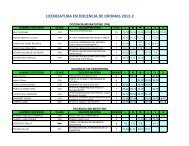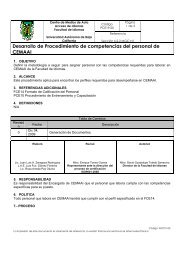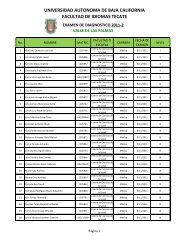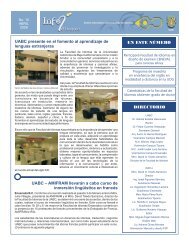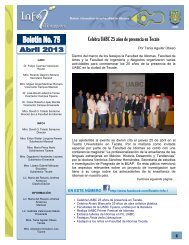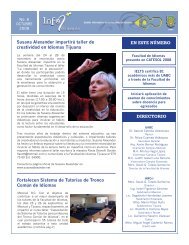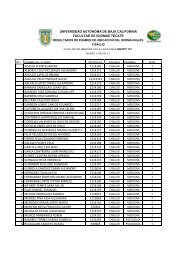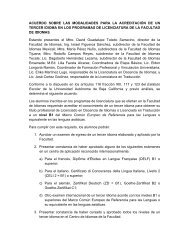- Page 1 and 2:
Tania Aguilar Obeso (coordinadora)
- Page 3 and 4:
Comité OrganizacionalCoordinadora
- Page 5 and 6:
Memorias en extensoCongreso Interna
- Page 7 and 8:
Contenidos/ContentsI. Proceso de en
- Page 9 and 10:
La escritura como rescate de experi
- Page 11 and 12:
él se ha preparado (lengua, histor
- Page 13 and 14:
compartir” no es una actitud dese
- Page 15 and 16:
docente determinada e, igualmente,
- Page 17 and 18:
escrito dirigido a nuestros alumnos
- Page 19 and 20:
consume tiempo, pero es precisament
- Page 21 and 22:
sentimiento -positivo o negativo- y
- Page 23 and 24:
ien” nuestro trabajo, debemos bus
- Page 25 and 26:
c. Revisión: consiste en dejar pas
- Page 27 and 28:
estructura. Huelga mencionar que en
- Page 29:
los dos puntos anteriores‒ y much
- Page 32 and 33:
ii. Seleccionar el código, el regi
- Page 34 and 35:
ser publicados. Los actuales progra
- Page 36 and 37:
American Psychological Association
- Page 38 and 39:
Durante el tercer Congreso Universa
- Page 40 and 41:
carece de un sistema de palabras de
- Page 42 and 43:
Después de muchos años de colabor
- Page 44 and 45:
Estudiante-docente, en el proceso d
- Page 46 and 47:
transcurso de su vida académica en
- Page 48 and 49:
Dado que la mayoría de la informac
- Page 50 and 51:
sería que el tutor aprovechara la
- Page 52 and 53:
¿Es posible el aprendizaje y la ad
- Page 54 and 55:
Las redes sociales pueden impactar
- Page 56 and 57:
Oldenburg (1989) señala que estas
- Page 58 and 59:
comprensión acerca de las activida
- Page 60 and 61:
Basados en el hecho de que la ense
- Page 62 and 63:
Livemocha es una plataforma de e-le
- Page 64 and 65:
herramientas que les permitan actua
- Page 66 and 67:
Feuerstein, R., Feuerstein, R. S.,
- Page 68 and 69:
La prosodia, reto para docentes de
- Page 70 and 71:
Al evaluar los resultados, surgen d
- Page 72 and 73:
que la motivación es mayor cuando
- Page 74 and 75:
Bartolí Rigol, M. (2005). La pronu
- Page 76 and 77:
Taller de aprendizaje 四 字 熟
- Page 78 and 79:
adquirir una forma de distinguir lo
- Page 80 and 81:
Cuadro 1. Marco de referencia para
- Page 82 and 83:
BibliografíaAoto, Y., Momose, T. &
- Page 84 and 85:
Los estudiantes necesitan sentirse
- Page 86 and 87:
dichas lenguas. Janés Carulla (200
- Page 88 and 89:
en esta área coinciden en que a lo
- Page 90 and 91:
ConclusionesLa UNESCO reconoce que
- Page 92 and 93:
Delors, J. (1997). La educación o
- Page 94 and 95:
Language Learning BeliefsLanguage l
- Page 96 and 97:
eported by some of our students as
- Page 98 and 99:
2. Teacher’s correction in L2 lea
- Page 100 and 101:
5. L2 practice in relation to langu
- Page 102 and 103:
Furthermore, applying specific stra
- Page 104 and 105:
El Marco común europeo de referenc
- Page 106 and 107:
comunicación sencillas; el indepen
- Page 108 and 109:
A través de esta metodología, se
- Page 110 and 111:
promovido entre sus estudiantes la
- Page 112 and 113:
cartas personales sencillas. Con es
- Page 114 and 115:
The Pedagogy of PronunciationMargar
- Page 116 and 117:
“factors involved in the intellig
- Page 118 and 119:
4. Guided practice with feedback.5.
- Page 120 and 121:
eing accorded to suprasegmental tha
- Page 122 and 123:
Políticas lingüísticas del Estad
- Page 124 and 125:
No obstante, a lo largo de las tres
- Page 126 and 127:
En el plano internacional, decisiva
- Page 128 and 129:
ConclusiónLas leyes aprobadas por
- Page 130 and 131:
La percepción del profesor de ingl
- Page 132 and 133:
En este marco la investigación aqu
- Page 134 and 135:
2. MétodoLos datos que aquí se pr
- Page 136 and 137:
objetivos están directamente relac
- Page 138 and 139:
Esto nos dice que los retos de la i
- Page 140 and 141:
En cuanto a la percepción más gen
- Page 142 and 143:
Stenhouse, L. (1980). Curriculum re
- Page 144 and 145:
taking a look at, and what’s a wa
- Page 146 and 147:
English for other subjects such as
- Page 148 and 149:
special is to create an event for t
- Page 150 and 151:
page was last updated. Finally, wit
- Page 152 and 153:
académicas y personales que podrí
- Page 154 and 155:
personal. Puede describir acontecim
- Page 156 and 157:
9. Inteligencia existencial, que se
- Page 158 and 159: El BALLI contiene una serie de cree
- Page 160 and 161: Se seleccionó el test BALLI de Hor
- Page 162 and 163: tecatenses lo confirman), y que un
- Page 164 and 165: Para concluir es importante mencion
- Page 166 and 167: White, C. (1999). Expectations and
- Page 168 and 169: Lehmann (n. d.) argues that the two
- Page 170 and 171: Trudgill (1999), on the other hand,
- Page 172 and 173: Everyone will agree that because of
- Page 174 and 175: ANNEX 1Sample of Surveys presented
- Page 176 and 177: La investigación en el aula y el p
- Page 178 and 179: programas institucionales que promu
- Page 180 and 181: formación profesional del maestro
- Page 182 and 183: descriptiva y experimental, parecie
- Page 184 and 185: válidos; ahora es aquel que se rec
- Page 186 and 187: el conocimiento y la educación, la
- Page 188 and 189: está realizando el estudio en el a
- Page 190 and 191: sucedan. Entre ellos se encuentran
- Page 192 and 193: condiciones que ahí imperan no son
- Page 194 and 195: La propuesta que se desea presentar
- Page 196 and 197: desean alcanzar (el número de tema
- Page 198 and 199: municaciónIIPlanteamiento delos ob
- Page 200 and 201: Cuadro 2. Fases del proceso de inve
- Page 202 and 203: el hombre tiene por investigar debe
- Page 204 and 205: Martínez Miguélez, M. (2004). Cie
- Page 206 and 207: of SLA arises, one automatically po
- Page 210 and 211: that country (p. 163).Clearly, in o
- Page 212 and 213: agree with the assertion that they
- Page 214 and 215: influence in the decision of studyi
- Page 216 and 217: CONCLUSIONTo summarize, it is evide


